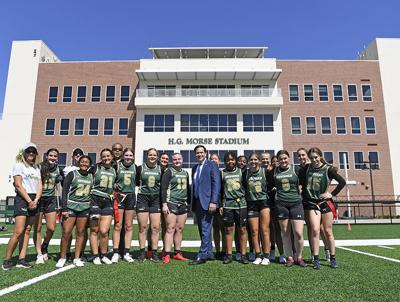Record-setting moments — and viewership — at the NCAA women’s basketball tournament. Female Olympians matching numbers with their male counterparts for the very first time. A high-profile push from U.S. Senator Marco Rubio to make flag football an NCAA sport.
Fifty-two years after passage of Title IX, women’s sports are enjoying a watershed moment. One easily can make an argument, in fact, that interest in women’s sports never has been higher.
“There was so much growth to be had in that area,” said Adrien Bouchet, chair of the DeVos Sport Business Management Program at UCF and director of The Institute for Diversity & Ethics in Sport.
“Women are 50 percent of the population — but for it to happen so quick, so fast, it’s surprising.”
Successful athletes have helped fuel the rise. Like, say, Caitlin Clark.
By now, she’s hardly a secret — especially if you caught the first 10 minutes of Iowa’s NCAA Championship loss to South Carolina. Or the Hawkeyes’ semifinal triumph over UConn. Or the win over LSU that sent them back to the Final Four.
Plenty did. They’re now the three most-watched games in women’s basketball history.
You’ll next see Clark on Monday, holding up an Indiana Fever jersey as the No. 1 pick of the WNBA Draft. Final Four MVP Kamilla Cardoso and Angel Reese will go soon afterward. The college game falls to capable hands in Paige Bueckers, JuJu Watkins and others.
Olympians have made huge strides, too.
For the first time in history, just as many women athletes will compete as men this summer in Paris. The International Olympic Committee gradually has been closing the gap in qualifying allocation for years; the U.S. Olympic team now leans majority female.
Two new women’s professional leagues also have launched in 2024, including one close to home.
Even closer to home, perhaps, Rubio is at the forefront of a push to expand women’s sports’ growing reach.
With flag football on the program for the 2028 Olympics in Los Angeles, Rubio and Sen. Jeanne Shaheen (D-N.H.) are pushing the NCAA to show its support by adding the sport to its list of sponsored championships.
“With this growing sport, and its benefits to women, the Olympic Committee’s announcement is timely,” Rubio said in a joint statement with Shaheen. “The NCAA should use this opportunity to proactively educate and encourage its schools to formalize programs.
“This in turn would allow collegiate women scholarship opportunities and serve as a feeder to the Olympics where they can proudly represent their country and school.”
While in The Villages on Friday, the Florida Republican met with members of The Villages High School’s flag football team during a tour of the school’s new campus in Middleton.
“It’s promising to see the support The Villages Charter School is providing women’s flag football,” Rubio said. “I look forward to the future of our female athletes succeeding in flag football programs, which is now an Olympic sport and I hope it will become an NCAA intercollegiate sport.”
The National Association of Intercollegiate Athletics (NAIA), which oversees some 250 small colleges, launched flag football in 2021 as an “emerging sport.” Seventeen schools now field teams, with five in Florida setting the pace — Warner University, St. Thomas, Keiser, Florida Memorial and Webber International.
It’s the latest in how significant women sports is becoming.
A 2023 study by marketing powerhouse Wasserman showed women’s sports received 15% of sports media coverage — triple what it was in any previous survey. In a just-released update, that number ticked upward again to 16%.
Nor did that study include the just-completed NCAA basketball showcase.
“We were at 4 percent forever. I can’t remember when we weren’t,” recalled tennis great Billie Jean King, at the forefront of the equality push since she spearheaded the 1973 founding of what’s now the WTA.
“But from five to 15 — that’s the first time we have ever had that jump. And that is a great indicator to people that we’re on our way.”
Here’s an even bigger indicator: The accounting giant Deloitte now forecasts revenue generated by women’s elite sports will surpass $1 billion for the first time in 2024. That also triples the previous survey, conducted in 2021.
“There’s a lot of disposable income in the United States,” Bouchet said. “And there’s a lot of disposable income that says, ‘We want to invest in women’s sports.’”
Said King: “People want to sponsor us. They care about us. They want us to have equality, particularly CEOs who have daughters.”
The sports marketplace is driven by performers whose achievements bring eyeballs to TV screens, backsides to seats and sponsorship dollars to the table.
Consider Clark as Exhibit A. The Iowa sharpshooter departs the college game as the all-time leading scorer in NCAA Division I — male or female — along with a slew of other records that include career 3-point baskets and NCAA Tournament marks for career points, 3-pointers and assists and most points in one quarter.
With Clark, Iowa drew 55,646 to a November preseason game at Kinnick Stadium, the school’s football home. The Hawkeyes set attendance records at 30 of 32 regular-season games not played on a neutral court.
And things peaked in the NCAA Tournament, capped by an average viewership of 18.7 million for the title game between the Hawkeyes and South Carolina. That’s the most for any hoops game since 2019 — men’s, women’s, even the NBA.
“I want to personally thank Caitlin Clark for lifting up our sport,” South Carolina coach Dawn Staley said amid her team’s postgame celebration. “She carried a heavy load for our sport, and it is not going to stop here (in college). When she’s the No. 1 pick in the WNBA Draft, she’s going to lift that league up as well.”
Thanks to the NCAA’s new rules allowing athletes to market themselves, Clark’s star was able to generate more than $3 million in sponsorship income, notably with State Farm, Nike and Gatorade. That money won’t dry up as she moves to the WNBA.
“She can stand on her own,” Bouchet said. “She will create a lot of viewership.”
Nor is she alone. The colorful Reese, who took MVP honors when LSU beat Iowa for last year’s title, generated some $1.8 million in deals with McDonalds and Reebok.
Beyond basketball, gymnast Simone Biles’ endorsement portfolio reached $10 million in 2022. Soccer icon Alex Morgan pulled down $6.3 million.
“(Sponsors) jump in when they can make money,” Bouchet said. “Maybe there’s a little bit of altruism there, but if an athlete’s attributes match up with a product’s attributes, that’s when they’re going to jump in.”
Money has flowed into women’s sports ownership, too. Consider this roster of A-listers who have joined ownership groups in the National Women’s Soccer League: Patrick Mahomes (KC Current), Kevin Durant and Eli Manning (Gotham FC), Grant Hill and R&B singer Tamia (Orlando Pride).
And then there’s Angel City FC, co-founded by Natalie Portman and whose ownership includes fellow actresses Jennifer Garner, Eva Longoria, Jessica Chastain and America Ferrera. Alexis Ohanian, Serena Williams’ husband, is a major shareholder.
Portman stepped up after seeing her son watch the 2019 Women’s World Cup with enthusiasm.
“It made me think what an enormously positive culture shift it would be if the next generation looked up to women’s athletes the way they look up to male athletes,” she told People magazine.
Angel City FC now is valued at upwards of $115 million, the Pride at $45 million. After record NWSL attendance of 1.37 million last season, the league signed a new $240 million media rights deal with CBS, ESPN and Amazon Sports. The league welcomed expansion teams in Utah and San Francisco this year, with two more in the works.
Women hockey players and volleyball players now also have outlets to play professionally.
The Professional Women’s Hockey League launched in January with six teams. Average attendance has hovered just north of 5,000, though crowds in excess of 13,000 have been recorded in Toronto, Detroit and Minnesota.
Mark Walter, lead owner of baseball’s Los Angeles Dodgers, is the PWHL’s primary investor.
The Professional Volleyball Federation, meantime, debuted in late January with seven teams. One is the Orlando Valkyries, who play home games at UCF’s Addition Financial Arena.
Bouchet recently attended a Valkyries game, noting “there was 2,000 people in the stands. That’s pretty good for a first-year women’s volleyball team.”
The Valkyries are owned by Boca Raton entrepreneur David Forman. The DeVos family, which owns the Orlando Magic, launched a franchise in Grand Rapids, Mich.
“Orlando is a city known worldwide for making dreams come true,” Forman said in announcing the Valkyries franchise. “And that’s what Pro Volleyball Federation is all about — providing a new horizon for these amazing athletes to be able to live out their dreams.”
It seems a popular concept these days.
“When you treat us like a sport,” Staley said last week, “you will get a return on your investment.”
Specialty editor Keith Pearlman contributed to this report. Specialty editor Jeff Shain can be reached at 352-753-1119, ext. 5283, or jeff.shain@thevillagesmedia.com.











Commented
Sorry, there are no recent results for popular commented articles.